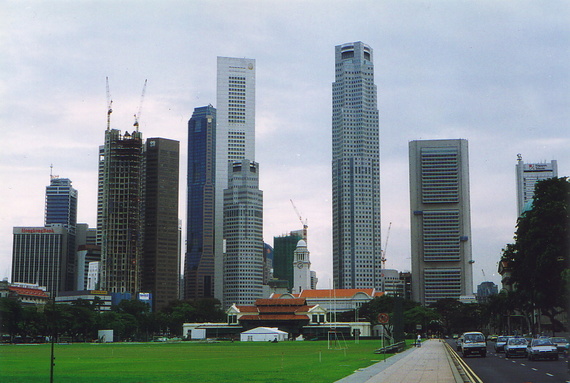officially the Republic of Singapore, is a Southeast Asian city-state off the southern tip of the Malay Peninsula, 137 kilometres (85 mi) north of the equator. An island country made up of 63 islands, it is separated from Malaysia by the Straits of Johor to its north and from Indonesia's Riau Islands by the Singapore Strait to its south. It hosted a trading post of the East India Company in 1819 with permission from the Sultanate of Johor. The British obtained sovereignty over the island in 1824 and Singapore became one of the British Straits Settlements in 1826. Occupied by the Japanese in World War II, Singapore declared independence, uniting with other former British territories to form Malaysia in 1963, although it was separated from Malaysia two years later. Since then it has had a massive increase in wealth, and is one of the Four Asian Tigers. The People's Action Party has won every election since self-government in 1959, and governs on the basis of a strong state and prioritising collective welfare over individual rights such as freedom of assembly, an approach that has attracted criticism from organisations such as Freedom House.
Some 5 million people live in Singapore, of whom 2.91 million were born locally. Most are of Chinese, Malay or Indian descent. There are four official languages: English, Chinese, Malay, and Tamil. Sultan Hussein Shah on behalf of the British East India Company to develop the southern part of Singapore as a British trading post. In 1824 the whole island became a British possession under a further treaty whereby the Sultan and the Temenggong handed it over to the British East India Company. The Japanese occupied Singapore until the British repossessed it in September 1945 after the Japanese surrender.
Singapore's first general election, in 1955, was won by the pro-independence David Marshall, leader of the Labour Front. Demanding complete self-rule, he led a delegation to London but was turned down by the British. He resigned on return and was replaced by Lim Yew Hock, whose policies convinced Britain to grant Singapore full internal self-government for all matters except defence and foreign affairs.
In elections in May 1959 the People's Action Party won a landslide victory and immediately made Singapore a self-governing state within the Commonwealth. which have increased its land area from 581.5 km2 (224.5 sq mi) in the 1960s to 704 km2 (272 sq mi) today; it may grow by another 100 km2 (40 sq mi) by 2030. Some projects involve merging smaller islands through land reclamation to form larger, more functional islands, as with Jurong Island. After independence, foreign direct investment and a state-led drive for industrialisation based on plans by Goh Keng Swee and Albert Winsemius created a modern economy.[50] As a result of global recession and a slump in the technology sector, the country's GDP contracted by 2.2% in 2001. The Economic Review Committee was set up in December 2001 and recommended several policy changes to revitalise the economy. Singapore has since recovered, largely due to improvements in the world economy; the economy grew by 8.3% in 2004, 6.4% in 2005 and 7.9% in 2006. After a contraction of -6.8% in the 4th quarter of 2009, Singapore was the fastest-growing economy in the world, with GDP growth of 14.5% for the year 2010. The country is generally conservative socially but some liberalisation has occurred. Foreigners also make up 42% of the population and have a strong influence on Singaporean culture. A.T. Kearney named Singapore the most globalised country in the world in 2006 in its Globalization Index. The Economist Intelligence Unit in its "Quality-of-Life Index" ranks Singapore as having the best quality of life in Asia and eleventh overall in the world. the S-League, formed in 1994, currently comprises 12 clubs including foreign teams. The Singapore Slingers, formerly in the Australian National Basketball League, is one of the inaugural teams in the ASEAN Basketball League, founded in October 2009. Singapore began hosting a round of the Formula One World Championship in 2008. The Port of Singapore, managed by port operators PSA International and Jurong Port, was the world's second busiest port in 2005 in terms of shipping tonnage handled, at 1.15 billion gross tons, and in terms of containerised traffic, at 23.2 million twenty-foot equivalent units (TEUs). It is also the world's second busiest in terms of cargo tonnage, coming behind Shanghai with 423 million tons handled.
 singapore city night
singapore city night singapore city flyere pics
singapore city flyere pics singapore city pics
singapore city pics singapore city
singapore city

No comments:
Post a Comment